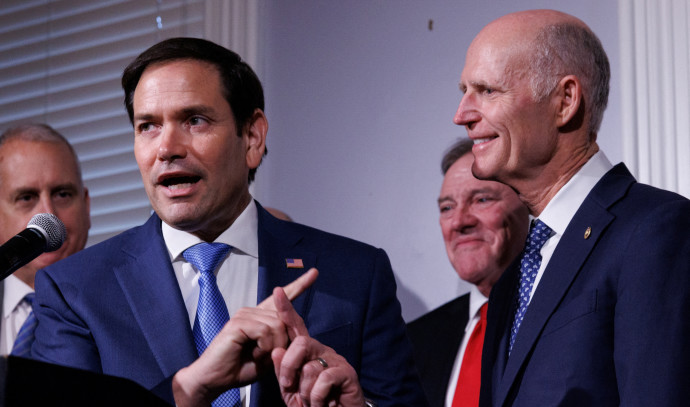During a CNN interview on Sunday, Senator Marco Rubio discussed Iran’s extensive efforts to destabilize Israel through a network of proxies from neighboring countries. Rubio highlighted the strategy aimed at surrounding Israel and making it “an unlivable place so that the Jewish state will collapse from within economically and socially.” He described this approach as a direct attempt by Iran to attack Israel not just militarily but also on socio-economic fronts, endangering the very sustainability of the state.
Rubio related to the Iranian attack on Israel early Sunday morning (Israel time), where 300 missiles and UAVs were shot down by Israel, the US and the UK.
Rubio emphasized the severity of the threats by detailing the visible terror tactics employed, such as the use of illuminated drones intended to be seen as they approach their targets. “That is why many of those drones had lights on, so you could see them coming in and the terror aspect of that,” he explained. This tactic is part of a broader psychological warfare strategy intended to instill fear and uncertainty among the Israeli populace.
The Senator also addressed the current geopolitical tensions, labeling the situation as the “most dangerous moment for the Middle East since 1973.” He refrained from prescribing specific actions for Israel but acknowledged their right and historical precedence to respond decisively. “Israel has a very clear military doctrine, and that is that they respond to attacks. By responding to those with something much more severe it is how they have survived,” Rubio noted, underscoring the existential necessity of a strong Israeli defense posture.
Israel’s history of survival
Reflecting on the historical resilience of the Jewish state, Rubio remarked, “This is a country, a Jewish state, that on its very first hour of existence was attacked in multiple directions by multiple countries. And it has not stopped since then.” He traced the lineage of threat and response that has defined Israeli military strategy, asserting that disproportionate responses to attacks have prevented further conflicts on the scale of those seen in 1967 and 1973.
As for the United States’ role, Rubio expressed confusion over the Biden administration’s handling of the situation, particularly concerning leaked conversations suggesting a restrained Israeli response. “What I don’t understand is why Joe Biden and the administration would leak to the media, the contents of a conversation in which he tells Netanyahu he doesn’t think Netanyahu shouldn’t respond at all,” he stated, highlighting a potential misstep in diplomatic communications.







